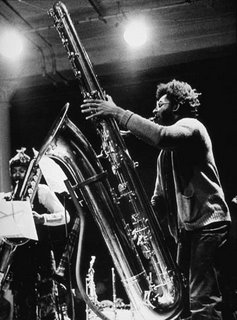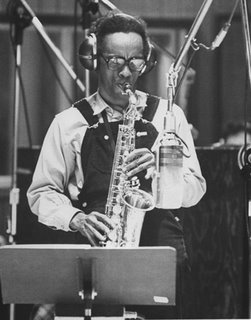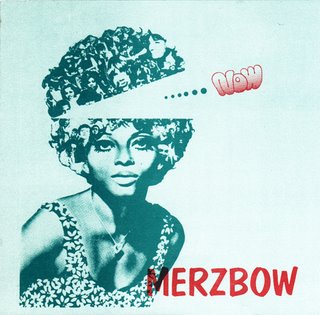
"It's like, everybody wanted to use freedom as a context to freak out, and that was not what I was talking about. One of the problems with collective improvisation, as far as I'm concerned, is that people who use anarchy or collective improvisation will interpret that to mean 'Now I can kill you'; and I'm saying, wait a minute! OK, it's true that in a free-thought zone, you can think of anything you want to think, but that was not the optimum state of what I had in mind when I said, let's have freedom. I thought any transformational understanding of so-called freedom would imply that you would be free to find those disciplines that suited you, free to understand your own value systems; but not that you would just freak out because 'the teacher's not there.' The teacher is still there!
It's one thing to talk about the post-Ayler cycle with respect to the events which took place in the first year, the second year. . . but if you look back at the last twenty years, what has freedom meant? For a great many people, so-called freedomis more limiting than bebop, because in bebop you can play a ballad or change the tempo or the key. So-called freedom has not helped us as a family, as a collective, to understand responsibility better. Only the master musicians, the ones who really understand what they were doing and who did their homework, have been able to generate forward motion. So the notion of freedom that was being perpetrated in the sixties might not have been the healthiest notion. I say 'healthiest notion' because I'm not opposed to the state of freedom; I believe that with correct information and an understanding of respect for humanity, human beings can rise to their potential. But fixed and open variables, with the fixed variables functioning from fundamental value systems--that's what freedom means to me."
Anthony Braxton en Graham Lock, Forces in Motion: Anthony Braxton and the Meta-Reality of Creative Music (London: Quartet, 1988), p240
Un Domingo Cualquiera:
Anthony Braxton For Alto (Delmark, 1968)
Circle Paris Concert (ECM, 1972)
Sea Ensemble After Nature (Red, 1977)
Wadada Leo Smith With The Bill Smith Ensemble Rastafari (Sackville, 1983)
Anthony Braxton Four Compositions (GTM) 2000 (Delmark, 2003)





 no vaya en busca de Merzbow por el mero hecho de la violencia y del mas es mas. La grabacion se realizo en 1983, siendo este su primer vinilo e iniciando una bifurcacion que se mantuvo durante los ochenta y que luego el propio Akita ya no ha sido capaz de controlar. "
no vaya en busca de Merzbow por el mero hecho de la violencia y del mas es mas. La grabacion se realizo en 1983, siendo este su primer vinilo e iniciando una bifurcacion que se mantuvo durante los ochenta y que luego el propio Akita ya no ha sido capaz de controlar. "